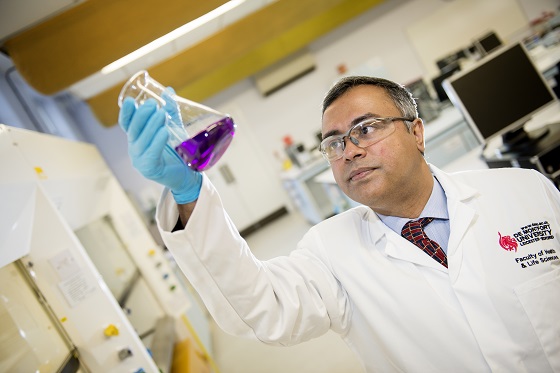New research from De Montfort University Leicester (DMU) suggests a lack of physical activity and poor sleep patterns during Ramadan can affect the health of people with Type 2 diabetes.
Hundreds of millions of Muslims around the world are observing Ramadan by taking part in a religious month of intermittent fasting that involves abstaining from food and drink from dawn to dusk.
But the DMU report’s authors have raised concerns that people with Type 2 diabetes should seek medical advice as to whether they take part or not.

The mosque in the Evington area of Leicester
They are also concerned that the global coronavirus lockdown could lead to a dramatic fall in physical exercise compared to previous periods of Ramadan, when people were free to visit their Mosque and visit friends and families to feast after dusk.
Dr Abdullah Alghamdi, under the supervision of Professor Parvez Haris, has based his advice on research which is the first to measure the effects of Ramadan on sleep patterns and exercise for people with Type 2 Diabetes using Fitbit data.
It has just been accepted for publication in Diabetes Therapy, an international, peer reviewed journal.
Dr Alghamdi carried out the study as a Faculty of Health and Life Sciences PhD student in his home country of Saudi Arabia, where he works in a healthcare centre, and recruited 16 women and 20 men with Type 2 diabetes.

Dr Abdullah Alghamdi is concerned about Type 2 diabetics during Ramadan
Each agreed to wear a Fit Bit to measure exercise, rest and sleep while also filling in a daily physical activity questionnaire. They did this for seven days during Ramadan and then for another seven days two weeks after Ramadan had finished.
While physical activity was low in both periods – the heat is a major factor on daytime physical activity in the city of Riyadh, where the volunteers were from – there was a significant fall in the amount of sleep people were getting during and after fasting. It was calculated that 50 per cent of the group were getting less than six hours a night during Ramadan, compared to around a third more than that following Ramadan.
Published research has shown that a lack of activity and small periods of night time sleep can affect the way the body uses insulin and glucose.
RELATED NEWS
Interested in volunteering during lockdown? Find out more here
How DMU is supporting the city right now
Coronavirus FAQs for students
Dr Alghamdi and Professor Haris’s research concluded that ‘the low physical activity and the poor sleep behaviours of the study’s participants may worsen their diabetes’ and furthermore this could ‘minimise the potential of Ramadan intermittent fasting as a non-pharmacological therapy’ for managing or even reversing Type 2 diabetes.
Dr Alghamdi said: “Under Islamic laws, people with a medical condition can be exempt from Ramadan. What I would say is anyone with Type 2 Diabetes should seek medical advice about whether they take part.
“Some people manage their diabetes perfectly well but others may be putting their health at risk.’
Dr Alghamdi and Professor Haris say previous published research had shown intermittent fasting can benefit the health of type 2 diabetics – but a total lack of activity could negate this.

Professor Parvez Haris supervised the new research
Dr Alghamdi said: “I am also concerned, during lockdown, about the lack of physical activity people will have. Normally during Ramadan people are walking to their Mosque and then visiting friends and families after dusk to eat and socialise. This cannot happen now. So people with Type 2 diabetes must really plan to use the hour of exercise a day that the UK Government allows during lockdown, irrespective of if they choose to fast or not during Ramadan.”
Professor Haris added: "This Ramadan, the combination of social isolation and inability to perform outdoor activities, or socialise with friends and families, is likely to impact the mental and physical health of everyone, including those with type 2 diabetes. To reduce these impacts, people should make an extra effort to keep in touch with families and friends through social media and telephone and also engage in additional physical activities inside the house."
Posted on Tuesday 28 April 2020